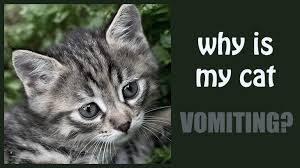Archive for April 1st, 2017
Vomiting in Older Cats
 As I mentioned a few days ago, my older cat Molly has kidney disease and hyperthyroidism. She has been vomiting almost every day now for about five days. Vomiting is common in geriatric cats with kidney disease. I am now getting very concerned. She is still eating and drinking normally but I need to get to the bottom of her vomiting.
As I mentioned a few days ago, my older cat Molly has kidney disease and hyperthyroidism. She has been vomiting almost every day now for about five days. Vomiting is common in geriatric cats with kidney disease. I am now getting very concerned. She is still eating and drinking normally but I need to get to the bottom of her vomiting.
There are many causes of vomiting in cats. Pet MD has detailed information on this subject. The following is provided by Pet MD.
There are so many possibilities for this condition that determining a cause for chronic vomiting may take some time. You will need to cooperate with your veterinarian in trying to pinpoint if there is anything related to your cat’s background or habits that might account for it.
Your veterinarian will begin by determining whether your cat is actually vomiting or just regurgitating (i.e., whether it is based in the stomach, or not). You will want to pay close attention to the pattern of your cat’s vomiting so you can give a thorough description of the symptoms, as well as how soon after eating the vomiting occurs. Your veterinarian will ask you to describe the appearance of the vomit, and what your cat looks like when it vomits.
If your cat is retching, and heaving from the belly, it is probably vomiting. The food that is in the vomit will be partially digested and somewhat liquid. A yellow fluid called bile will normally be present along with the expelled stomach contents.
If the cat is regurgitating, it will lower its head and the food will be expelled without a lot of effort. The food will be undigested and probably will be tubular in shape, more often solid and covered with slimy mucus than not.
Your cat may try to re-eat the regurgitated food. It is a good idea to keep a sample of the expelled content, so that when you take your cat to see the veterinarian, an examination can be made to determine whether the material is vomit or regurgitation, and what might be present in the contents.
Your veterinarian will need to know about your cat’s activities, habits, and surrounding environment, as well as what medicines your pet may be taking. Factors that are significant and must be followed-up on immediately are instances when the vomit has granule-like granules in it (may appear like coffee grounds). These granules are indicative of blood being present in the vomit. Fresh blood in the vomit will often indicate stomach ulcers or cancer.
If your cat has a fever, a stomachache, jaundice, anemia, or masses in the stomach, your veterinarian will be able to make a more specific diagnosis.
Remember, your pets count!
The weekend is here and make your favorite oldies part of your weekend. The Edgewater Internet Radio Network provides three great oldies stations for your enjoyment. Edgewater Gold Radio – features four decades of a great variety of oldies from the 50’s through the early 80’s plus great pop standards. Rehoboth Radio – plays the 50’s and 60s exclusively. The Beach Station features more great oldies from the 50’s 60’s and 70’s plus great beach songs!